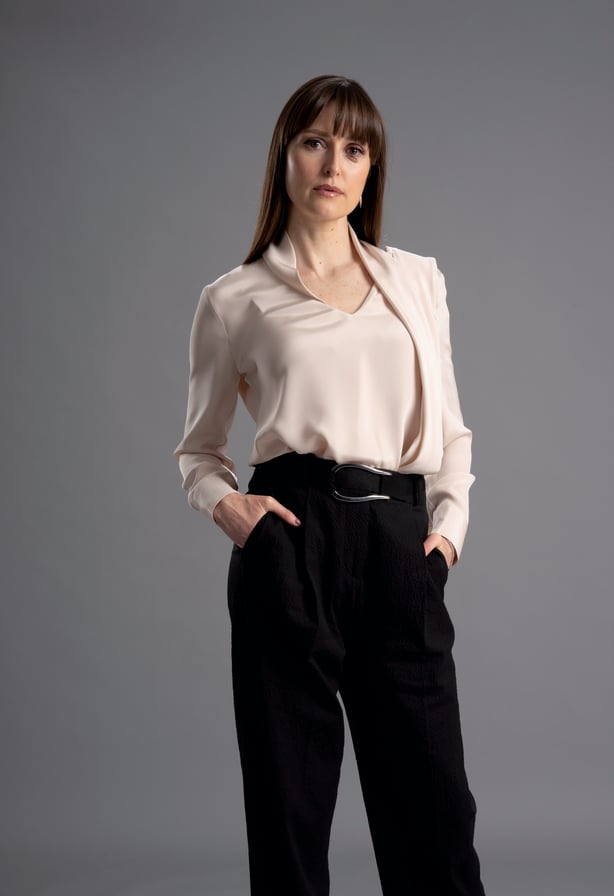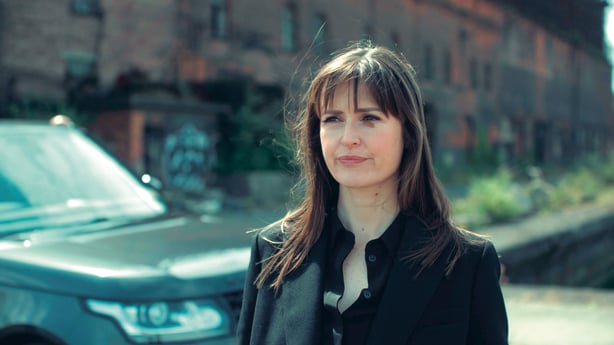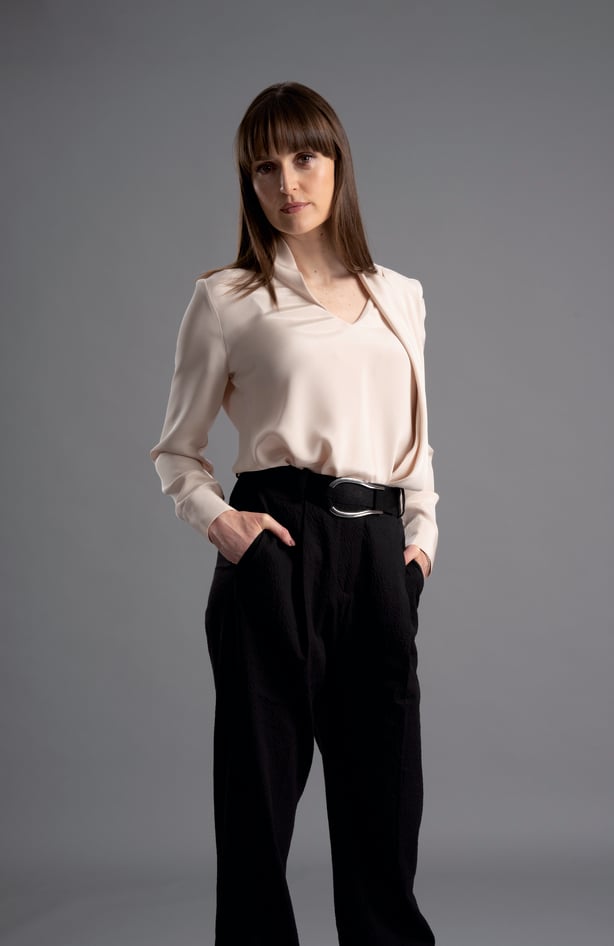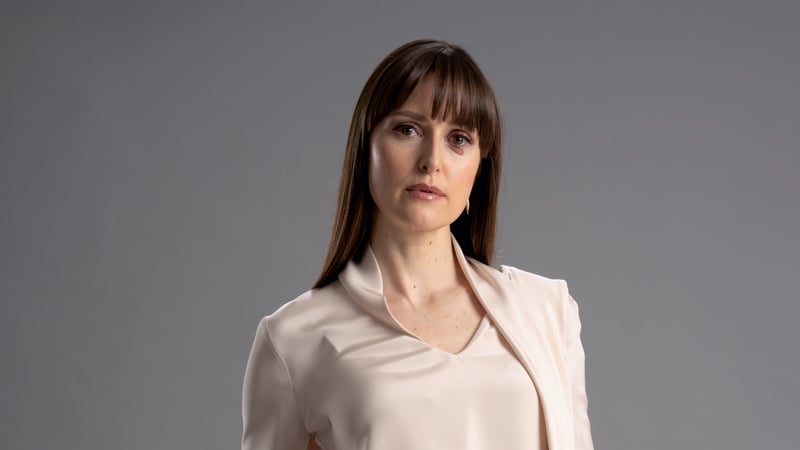Shooting star Clare Dunne is back in the limelight as Amanda Kinsella, the shrewd operator pulling the strings in season two of Kin. Donal O'Donoghue talks to the actor and writer about family, the significance of story-telling and building her own home.
"I’ve been a bit naïve in my career and I only learned as I went along," says Clare Dunne, actor, writer (Herself), and star of the RTÉ gangster drama, Kin, in which she plays Amanda, the de facto boss of criminal clan, the Kinsellas.
"But now I see that as a strength and also weirdly how I align with Amanda, someone who is also learning as she goes. Of course, you fall on your face in front of people, but you also learn lessons in a much deeper way and so you’re ultra-prepared for every possible thing that can go awry.
"In theatre acting, you fall on your face in front of an audience all the time and that can be so refreshing and life-affirming. It’s about being able to fail in front of people and get up again. We all need to be reminded we can do that. And I like that about Amanda: when she gets knocked down, she gets up even stronger."

Clare Dunne (33) might be late to the TV game (2021’s Kin was the small-screen debut of the stage and film actor) but the Dubliner’s star is firmly in the ascendancy. Last year she was named as one of ten Shooting Stars at the Berlin Film Festival on the back of Herself and Kin.
Inspired by true-life, Herself tells the story of a young mother (Dunne) who escapes her abusive husband and sets out to build her own house and also rebuild her life.
Co-written by Dunne and Malcolm Campbell, it won an IFTA for Best Script and was picked up by Prime Video in the US. Anchored by Dunne’s compelling central performance, the film was smartly followed by Kin.
"With the Shooting Star they told us that its impact plays out over a long time," she says. For now, we’re back on the mean streets of Dublin with Amanda Kinsella – and Dunne – forging their futures.
Before it debuted in September 2021, Kin, with its Dublin gangland backdrop, was being touted as ‘Love/Hate 2.0’. But the clue was in the title of Peter McKenna’s drama, a story as much about the complexities of family as it was about the glinting glamour of gangsters.
"I suppose if Love/Hate was like The Wire or suchlike, our show is like The Sopranos," says Dunne. "In fact, HBO didn’t buy the show because they thought it was too like The Sopranos. People also say to me that Amanda reminds them of Walt White in Breaking Bad because she also breaks bad.
"Now season two continues with a lot of these portraits of various characters and goes inside them a bit more. The women start to become something deeper in the new series which is very like a game of chess: there are a lot of big characters on the board, and the story plays out very, ah, intricately."

Unsure what she can and cannot say about season two, Dunne speaks in generalities. "There are shifts of power within the family and there is also an old member returning to the family that causes ructions internally," she says of a changed landscape following the assassination of top dog Eamonn Cunningham (Ciarán Hinds), a killing that brings repercussions from a Turkish cartel.
"So now the family are getting attacked on all sides, from without and within. This is a real earthquake divide that could potentially split the family irreversibly. The enemies outside are more international and more sophisticated. In many ways it’s more of the same but massively ramped up with a much bigger cast and more complex storylines. Amanda’s a good boss but problems happen because otherwise there would be nothing to watch."
Clare Dunne, who grew up in housing estates in the Dublin suburbs of Ballinteer and Ballyboden, knows all about the intricacies of family. "My mam was one of eleven, dad was one of ten and I have five siblings," she says.
"Anytime a friend was at a family dinner they were like ‘I can’t keep up, it’s like ye are telepathically joined, finishing each other sentences and the rest.’ And I really feel for any fella I introduced to the family." She laughs but I imagine the drama was part of the craic for someone who from very early was an entertainer (or "total messer" as she puts it).

Her mother sent her to drama clubs after school, her granny took her the theatre and all along Clare was writing - poems, songs and latterly for stage and screen. "My mam used to say to us if we were struggling with something ‘just write out your anger and then tear it up and put it in the bin.’"
Today Dunne describes herself first and last as a storyteller, a belief informed by her reading of Harriet Walter’s Other Peoples Shoes when she was 16.
"It explored her journey of not just becoming an actor but a storyteller, and how stories can shape the world. That book helped me understand how writing and acting is not all for nothing: it’s part of our survival as humans on this planet. Storytelling is in our DNA and with her book Harriet was trying to show what acting can do for people, whether it is witnessing a performance and being moved by it or whether it’s a story as big as the Magdalene laundries. I believe those films helped to break a seal on something and tapped into that wound in our mass consciousness with which we are still dealing. It opened the doors. And that book made me realise ‘God this is a real job.’"
We need your consent to load this Instagram contentWe use Instagram to manage extra content that can set cookies on your device and collect data about your activity. Please review their details and accept them to load the content.Manage Preferences
Years later Dunne would end up playing Walter’s wife in the Donmar Warehouse’s all-female Shakespeare trilogy, directed by Phyllida Lloyd.
"When I got the role, I learned that Harriet Walter was playing the lead, Brutus, and I was playing her wife, Portia. It was one of those weird moments of meeting your hero, and she ended up a dear friend. Over the years since then, I was writing away until Phyllida Lloyd said, ‘I heard that you were writing a screenplay’ and that’s essentially how Herself came about. And having worked with Harriet I asked if she would consider the role and so we shot it (Lloyd directed) around her availability."
Herself was always more than just a job. Dunne is now an ambassador for the charity Women’s Aid and also St Brigid’s Day, and her passion for the themes explored in Herself still burns fiercely.
"Everyone has a right to housing, it’s a human right and it’s a shame that in Ireland property is more important than people," she says. "I’m not political, I’m not left or right or whatever, it’s just from what I learned in the process of making Herself. And a house can be done very cheaply.
"There are amazing eco-friendly self-builds being done all over this country. And while my film is a bit dark and hard-hitting in some ways, it’s also about coming from the dark into the light. It’s about redemption and the spirit of who we are as Irish people and taps into who we were before we were colonised. We are community-based, a meitheal, and that was just part of our lives. Now that might make me sound utopian but it’s not that – it’s about drawing on the best things from our past to make our future."
We need your consent to load this Instagram contentWe use Instagram to manage extra content that can set cookies on your device and collect data about your activity. Please review their details and accept them to load the content.Manage Preferences
Whatever happens, Clare Dunne’s future seems bright. Buoyed by the advice of her late granny, given when she was at a career crossroads – "no matter what you decide, it’s going to be okay" – she has put her faith in storytelling and the belief that it can make a difference.
"I’ve always been interested in doing shows and drama that connect with people," she says. She’s currently filming an indie feature in Dublin, will be doing theatre workshops in Mountjoy prison, is working between the acting on her next film script. She also signed up for a basic course in sustainable house building with self-build guru, Harrison Gardner.
"I’d love to buy a house in Dublin but if I could build one somewhere that would be even better. In that way I could also be a proper example of everything I’ve been going on about (laughs) and put my money where my mouth is."


